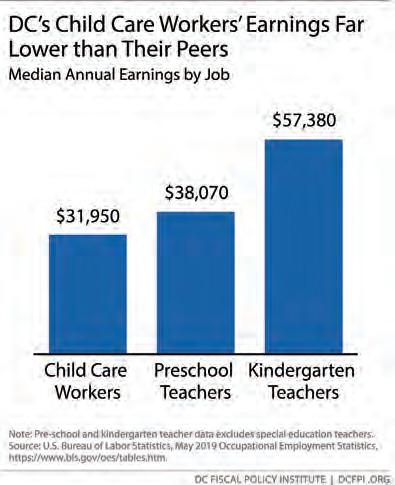
4 minute read
The Numbers: A Failure to Address Childcare Crisis, DC Council Underfunds in Wake of COVID-19 by Alyssa Noth
neighborhood news
/ The Numbers /
A Failure to Address Childcare Crisis DC Council Underfunds in Wake of COVID-19
by Alyssa Noth
Childcare is a critical part of our economy. A parent who can drop their child off in a quality childcare setting has peace of mind that their child is safe and well cared for. Having childcare as an option gives parents an opportunity to earn a living, contribute to their family, and provide for the child. Children who attend childcare programs develop emotional, academic, and social skills that improve their academic readiness. While parents and providers alike understood the importance of quality childcare environments before the pandemic, stories of the losses our children face without it have reinforced just how integral it is to our city and our society.
Over the past five months COVID-19 has devastated the District’s already fragile childcare system. The pandemic-induced shutdown forced centers to close across the city, and because childcare centers typically operate on the margins without significant savings, some providers may not be able to reopen. In fact, the District is at risk of permanently losing 6,500 childcare seats, or 20% of the total slots available pre-pandemic, according to the Cen
ter for American Progress.
Additionally, childcare centers will face steep public health costs in reopening. Keeping children and families safe will require smaller class sizes, more staff, higher cleaning costs, and facilities adjustments—leading to an increase in expenses during a time of fluctuating attendance and decreased revenue for centers and providers. Others may struggle to recruit students given mass layoffs of parents forced out of work by the pandemic.
Black and Latinx families—who are already bearing the brunt of COVID-19—are at particular risk of losing access to childcare. Even before the pandemic, families of color were less likely to have access to affordable, highquality care, which is out of reach for many low and moderate-income families. In DC, center-based childcare for infants and toddlers is more expensive than in-state tuition and fees at a public university.
Unfortunately, this fiscal year DC lawmakers passed a budget that failed to properly aid the city’s childcare industry. The Council approved $5 million in emergency grant funding in the fiscal year (FY) 2020 supplemental budget that will be made available through the Office of the Deputy Mayor for Planning and Economic Development. Additionally, through partial repeal of a tax credit for high-tech companies, DC Council approved $1.4 million in emergency grant funding through the Office of the State Superintendent of Education (OSSE) for FY 2021. The total $6.5 million investment falls short of the minimum $10 million the Under 3 DC coalition estimates is needed to stabilize the industry (Figure 1). Affordable, quality early learning environments are fundamental to the well-being of young children. Access to strong
fig. 1


fig. 2
early learning programs can reduce the di erence in school readiness between low-income toddlers and their higherincome peers. Children who receive quality care also grow up to earn more money as adults. The Child Care Subsidy/Voucher program, administered by OSSE, provides families with vouchers that they can use at licensed providers. However, childcare subsidy payments are not enough to cover the full cost of care and as a result, early childhood educators—predominantly women of color—are vastly underpaid compared to their peers in K-12 education (Figure 2).
District of Columbia Public Schools (DCPS), which serves students ages three and above, recently announced that school will be virtual-only for all grades for at least the rst term of the 2020-21 school year. Parents of three, four, and ve-year olds may need in-person childcare due to the unfeasibility of digital learning for the youngest students. This means there will be even greater demand for childcare at a time when availability is dwindling without a cohesive plan to support working parents, especially those in essential jobs that are often done by people of color and are least likely to be done from home.
As economist Betsy Stevenson wrote, “Childcare is not a personal issue, it’s not a women’s issue; it’s an economic issue.” Childcare is an economic issue because we know that investments in high quality care in a child’s early years can result in increased parental earnings and higher future earnings for children. At a time of unprecedented economic crisis, the DC Council failed to add any funding to the childcare subsidy for the rst time in several years. Without signi cant public investments in childcare, there is no way the District will be able to equitably recover from the crisis.
Alyssa Noth is a Policy Analyst at the DC Fiscal Policy Institute (www.dcfpi.org). DCFPI promotes budget and policy solutions to reduce poverty and inequality in the District of Columbia and increase opportunities for residents to build a better future. DCFPI is a member of the Under 3 DC Coalition. ◆
Now Available ONLINE @ in the Whole Foods Section

Extra sweet, tender & juicy. You can taste its quality in every bite!


100% ALL NATURAL! NO added sugar, additives, coloring or preservatives








